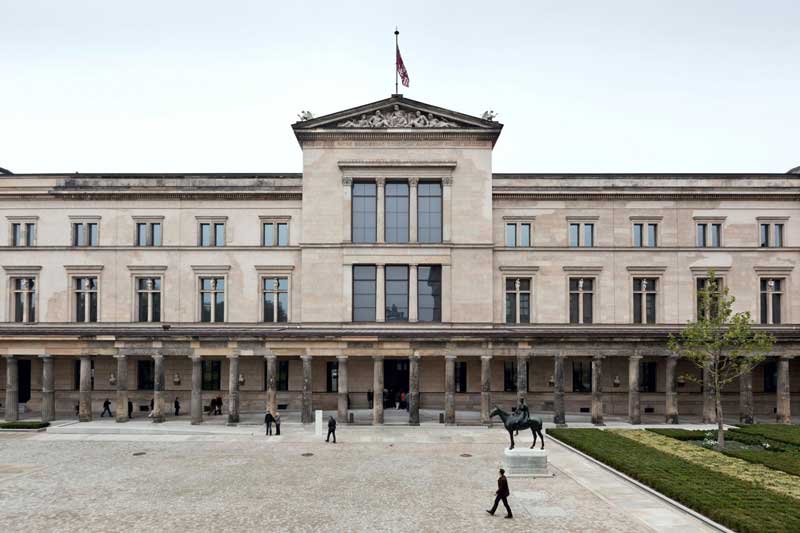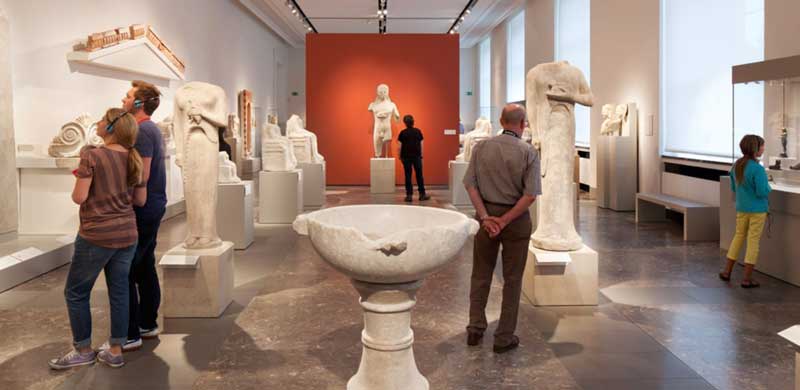
Built from 1843 to 1855 by order of King Frederick William IV of Prussia, the Neues Museum was the second museum to be built on Museum Island, an island in the River Spree, located in the historic centre of Berlin. Conceived as a cultural necropolis, the museum is part of a complex of magnificent neoclassical buildings on the northern part of the island. The museum, designed in a strict Grecian neo-classical and Renaissance Revival style by the great Prussian architect Karl Friedrich Schinke, is now known as Museuminsel.

The structure of the museum is considered an important monument in the history of construction and technology, as the soft sandy soil of the river island posed a challenge for construction. To meet the challenge, a pile structure, consisting of 2344 wooden foundation piles, was erected under the proposed three storey building and the building above the basement was constructed as lightly as possible. Stone floors were constructed on a base of shallow vaults of hollow terracotta pots between a grid of ironwork and supported by columns, but the columns on the third floor were made of iron, clad in cast zinc ornaments to give them the classic look.
While the ceremony of laying the cornerstone took place on 6 April 1843, construction of the walls was completed at the end of 1843 and by 1844, the cornice and roof of the museum were also completed. After completing the construction of flat vaulted ceilings and brick-lining of the connecting gallery to the Altes Museum or the Old Museum in 1845, work began on the building's façade, apart from the sculptures in the pediment. Although work on parts of the interior decoration, in particular the wall frescoes in the main stairway at the centre of the building continued until 1866, the museum was finally opened to the public in 1855.

The nearly rectangular building, originally measuring 344 feet (105 m) long, oriented north to south, and 130 feet (40 m) wide is nearly perpendicular to the Altes Museum. The two individual buildings were initially connected by an 80 feet (24.5 m) long and 23 feet (6.9 m) wide bridge, supported by three arches, which was destroyed during World War II. The two interior courtyards of the building, known as the Greek courtyard and the Egyptian courtyard, are surrounded by its three main wings. However, from its inception, only the northern Egyptian courtyard was covered with a glass ceiling, the southern Greek courtyard was covered similarly much later, between 1919 and 1923.

The building of the Neues Museum was severely damaged during the extensive bombing of Berlin in 1941 and at the end of the Great War, the ruin of the museum, located in the Soviet-occupied eastern part of the city, was left to decay for a prolonged period. Although a significant stabilisation programme was launched in 1986 by the East German Government to enable the building’s restoration, it was found to have sunk around half a metre into the soft ground. Therefore, before it could be underpinned with a concrete raft, the superstructure had to be repaired and reinforced, after being minutely surveyed. As a result, the original soft 19th-century brickwork was replaced with hard bright red engineering bricks and cement-rich mortars, to be covered in future restorations.
However, the project was suspended after the fall of the Berlin Wall and subsequent German reunification and the structure remained largely exposed to nature until a renovation project was launched in 2003, under the supervision of David Chipperfield, in collaboration with Julian Harrap. While David Chipperfield worked with the new structure, Julian Harrap restored the old. The project was completed by January 2009 and after remaining in ruins for 60 years, the museum was reopened to the public in October 2009.

The northwest wing and the southeast façade, completely destroyed in the war, were reconstructed in a manner close to their original layout. While the existing row of columns located in the eastern and the southern side of the museum were rebuilt, the white concrete and the light fixtures render a formal ambience to the museum. The galleries flank both sides of the courtyard with stairs in the middle and a big hall made of brick rests at the top of the main staircase. Continuity is maintained by retaining the original sequence of rooms, but the space occupied by the south dome is topped by a lantern made of sandblasted glass, rendering a creepy look to the interior. However, the glass and steel roof of the Greek courtyard allows enough daylight to seep in.

Today, the Neues Museum, covering 8,000 square metres (86111.28 square feet) and spreading over four separate levels, contains around 9,000 invaluable historical exhibits, which include the collections of the Egyptian Museum (Ägyptisches Museum), Papyrus collection (Papyrussammlung) and objects from the Pre and Early Historic period. Even, some artefacts date back to Classical times. Starting with the history of the collection and of Egyptology, the exhibition of the Egyptian Museum provides the changes that occurred over the course of four millennia in ancient Egyptian and Nubian cultures.
Starting with the display of portrait heads of several kings, the exhibition leads to the magnificent Berlin Green Head, an intelligent-looking, calm and emotionless, ancient Egyptian statue head of a middle-aged man made of Greenschist. It is followed by the works from the Amarna period, which includes the famous head of Tiy, the grandmother of Tutankhamun and the world-renowned bust of Nefertiti, the Great Royal Wife of Egyptian Pharaoh Akhenaten, the tenth ruler of the Eighteenth Dynasty, believed to have been crafted in 1345 BC.

Around 6000 exhibits from the Museum for Pre- and early history and the Berlin antiquities collection, consisting of the archaeological finds from Europe and parts of Asia, are also displayed in the renovated Neues Museum, elaborately exhibiting the cultural history of those regions from the Stone Age up to the middle Ages. On the ground floor, the room marked as the Odin, Urns and Looted Art, is decorated with the19th-century wall paintings of Nordic mythological scenes, followed by the rooms dedicated to Heinrich Schliemann’s collection of artefacts recovered from Troy and the cultural history of neighbouring Cyprus. The second floor displays the Stone Age with archaeological items relating to the Neanderthals, an extinct species or subspecies of archaic humans, discovered from Le Moustier in southwestern France, the Berlin Gold Hat, a Late Bronze Age artefact made of thin gold leaf and the diverse culture of the pre-Roman Iron Age.
As a part of the historic centre of Berlin, the Neues Museum is enlisted in the UNESCO World Heritage Site.